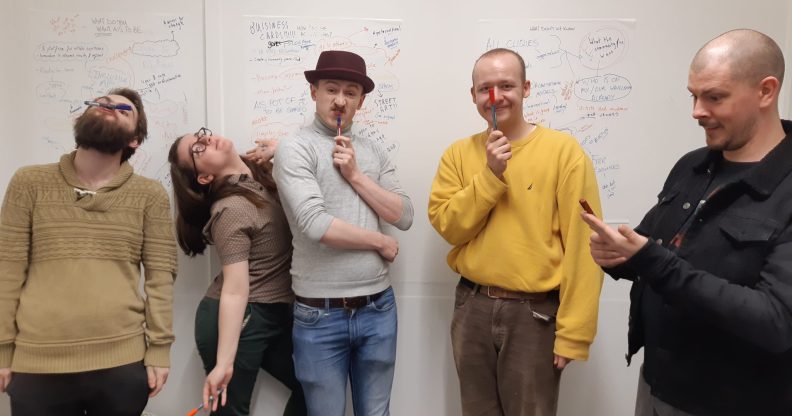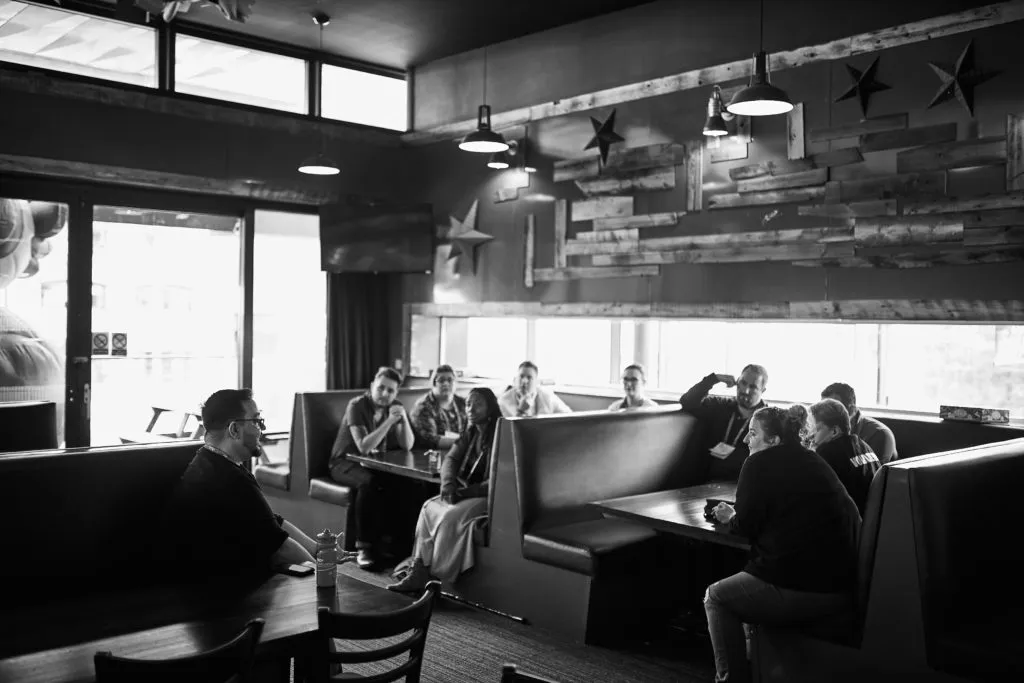Meet the coach teaching LGBT+ folk how to ‘find their authentic voices’

(Supplied)
“Professional busybody” Andy Farenden is on a mission to empower LGBT+ people.
Andy Farenden, co-founder of 3° of Innovation, is a coach, designer and educator who specialises in coaching for the LGBT+ community.
His organisation provides workshops, programmes and personal coaching to both individuals and businesses, to help develop confidence and skills in the workplace and public life.
Farenden told PinkNews how he uses his own lived experience as a gay man, and helps the LGBT+ community “find their authentic voices”.
Could you introduce yourself briefly?
I’m Andy Farenden. I’m a human-centred coach, designer and social entrepreneur – it’s probably easier to call me a ‘professional busybody’.
I’m the co-founder of 3° of Innovation and my focus within the organisation is specifically around supporting LGBT+ people in finding their authentic voices and be heard, especially in public and work environments.
I’m really lucky to have two exceptional partners in this too. Katy Baggott is an incredible executive development coach who’s worked for some massive international corporate organisations in the past such as Mars and Coke-a-Cola.
Rich Askam is an international speaker with a background in personalised marketing – he’s responsible for bringing the Share-a-Coke campaign, where you could get bottles of Coke with your name printed on, to the UK.
What inspired you to set up 3° of Innovation?
As I said, I’m a professional busybody and I’m quite lucky to be the licensee for TEDxBrayfordPool up here in Lincoln.
Katy and Rich have both supported the programme since we started in 2017 and 3° of Innovation just sort of naturally came off the back of it.
We sat having coffee (back when you could meet people in public!) and had a conversation about the fact that we love working together but really only get to do it a couple of times a year, so how do we do it more regularly?
So, we started to take our first tentative steps towards creating something a bit more solid and launched 3° of Innovation in January 2020 with the goal to help people overcome their fears of public speaking.
Then COVID-19 happened. We suddenly found ourselves in wholly uncharted water along with everyone else trying to figure out who was waving and who was drowning.
What we realised was that we could help people more than just overcome their fear of public speaking, but to really empower people to find their authentic voices through better understanding who they are as people, and what they really want out of life.
You work with a lot of LGBT+ young people who, as we’ve recently seen, are an especially vulnerable group when it comes to their mental health during the pandemic. How have you seen this vulnerability play out in your coaching sessions? What sort of issues do you help young people with?
As a gay man rapidly approaching 40, I’m finding the pandemic is massively affecting my own mental health. I can only imagine how hard it must be if you’re 14, just coming out and in a place that doesn’t feel safe.
I think it’s worth mentioning at this point that while coaching is therapeutic, it’s not therapy. It’s also absolutely confidential, so I can’t talk a great deal about what happens in coaching sessions.
More generally, coaching sessions are designed to help people find their own answer to affect positive change in their lives.
When it’s appropriate, I draw on my own lived experience as a gay man as part of my coaching practice to help set healthy goals, build confidence, core identity, communication skills, self-leadership and forming positive relationships.
In a world of social media driven instant gratification, coaching offers a chance to slow things down and reflect on what’s really important, how to combat limiting self-beliefs and build positive coping strategies for things like imposter syndrome for example.

Andy Farenden, who specialises in LGBT+ coaching, speaks at TedX Brayford Pool. (Andy Farenden)
Do you see a connection to the shame and stigma attached to being a member of the LGBT+ community in your work?
Yes, absolutely! Especially when working with people around my own age.
For me, coming out in the ’90s, there was a real palpable sense that being anything other than straight was unacceptable.
This was in part due to Section 28, a lack of equal age of consent, the grips of the HIV hysteria and a whole cauldron of other factors that played out around that period too.
However, I’m not sure it’s gotten any better over the last 20 years; as a 2019 study by YouGov of over 1000 teachers revealed, 13 per cent of children are bullied because of their sexual orientation or perceived sexual orientation, which is higher than any other bulling factor recorded in the study.
What role does empathy play in your work? Do you ever draw upon your own experiences to help others?
Being able to empathise is a really important part of the coaching process, but as coaches we all try not to bring our own experience and baggage into people’s sessions, because it’s their time to reflect and work through what matters to them.
However sometimes you can’t help but let that baggage and experience show.
My own experience of coming out, living authentically and being an activist in my younger days does bleed in and I have cried my eyes out with clients hearing about their own experiences in the same areas.
What are the broader barriers to young LGBT+ people’s success — in or outside of work?
To me, the biggest barrier is still the general societal perception of the LGBT+ community, and especially right now for trans people.
Whilst legislation offers protection in the workplace and in the provision of goods and services, there’s still everyday prejudice: it’s those sentences that start “I don’t mind gay people but…” and “I can’t tell if they’re a boy or a girl” that you overhear on the bus or in the queue for coffee, which goes back to that internalised perception of shame and stigma.
Also, you never really stop coming out: it’s not a one-time thing and you’re always negotiating that internal battle every time you meet a new person.
How can these challenges be tackled?
It all comes down to education and teaching from an early age that people are different and that’s OK.
That’s just part of it though because whilst that’s going to help the next generation, it doesn’t really help the current generation, which is where coaching can help.
Working with a coach to explore and solidify you personal identity, tackling limiting self-beliefs and overcome things like imposter syndrome can help develop the confidence to challenge those everyday prejudices whether that be in a work or personal setting.

